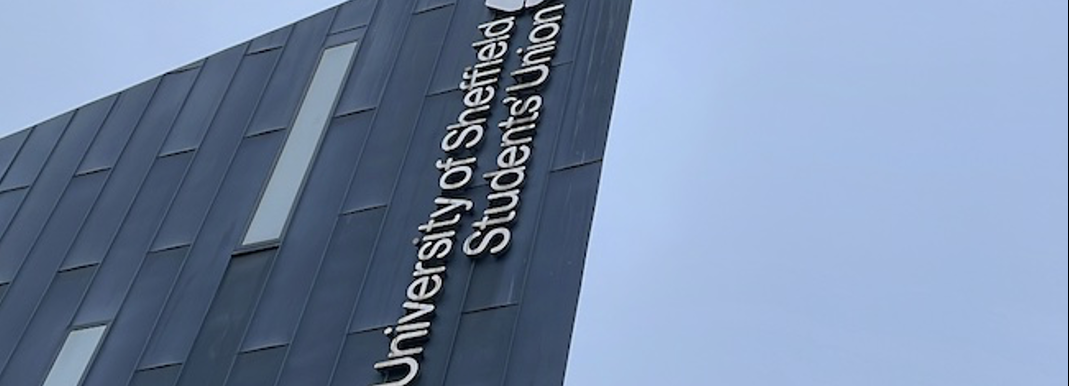By DEBBIE BALL, CAMRI DOCTORAL RESEARCHER
Although it was my first time at Association of Internet Researchers and my first time at a digital media conference, I won’t start with with me stepping off the train at Sheffield, wide-eyed and fresh-faced embarking on the latest part of my academic journey. Instead, I felt a sense of trepidation, which was surpassed by my general excitement to be attending AoIR as an early career doctoral researcher. Hosted at University of Sheffield from 30th October to 2nd November 2024, my week at AoIR turned out to be welcoming, enjoyable and – most importantly – intellectually stimulating. The entire global digital media academic community was in attendance, and I was there to get involved, inspired and fully amongst it!
Because this year’s conference celebrated 25 years of AoIR, it seems fitting to begin with a few takeaways from the anniversary plenary, aptly named the Eras Tour. Following some slides from the very first conference in 2000 held in Lawrence, Kansas, featuring presentations on communication, relationships, community networks, identity, politics, discrimination and sex, AoIR co-founder Nancy Baym concluded that
“These concerns still drive much of our work… we’re still motivated by the same concerns that got us together in the first place. May that last forever.”
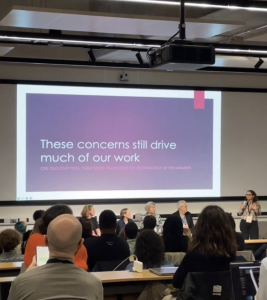
Nancy Baym, The Eras Tour plenary @ AoIR 2024, University of Sheffield
It cannot be emphasised enough that there still is a lot of work to do. As digital scholars, we’re here to hold Big Tech to account, to critically analyse the digital landscape that filters our everyday lives and impacts society in manifold ways. Limor Shifman from Hebrew University of Jerusalem and president of AoIR from 2010 – 2014 also made a moot point about how her era signalled the paradigmatic shift from the seemingly innocent use of social media to that of marketing, denoted by how we as users were recategorised, from friends to followers. A move that paved the way for today’s hyper commercialised state of social media, datafication and market optimisation, including the current period of commercial AI integration. This will doubtlessly accelerate under the new Trump administration, the portentous result of the US election announced merely days after AoIR 2024. At the very end of December 2024, Meta announced their new AI features, including populating Instagram and Facebook with AI-generated accounts to help with tasks like sharing content and acting as intermediaries for influencers… Contrary to Facebook’s hardline stance on authentic profiles, now it would appear that you don’t have to be a human to hold a Meta account or interact with fellow users. If ever there was a time to sharpen our critiques of Silicon Valley and strive for greater socio-political accountability, it’s now.
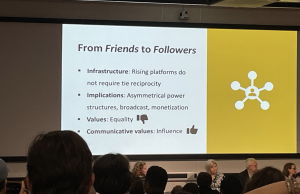
Limor Shifman, The Eras Tour plenary @ AoIR 2024, University of Sheffield
Resisting the temptation to enthuse about everything I experienced at AoIR 2024, here are three things I enjoyed the most. Which included taking part in an amazing archiving workshop, research design chats and inspiring digital methods talks.
An amazing archiving workshop
I attended AolR from Tuesday 30th October to take part in a pre-conference workshop about responsible digital archiving, hosted by Robyn Caplan from Duke University and João C. Magalhães from University of Groningen. The workshop was insightful as it was cathartic: it was indeed ‘group therapy’ as drily quipped by one of the hosts ahead of our first task to compare experiences working with the fortress-like opacity of social media platforms. Issues discussed ranged from the displacement and loss of withdrawn API access to navigating badly designed policy pathways and researching topics that have been shadowbanned. The presentation from ZeMKI at University of Bremen about their Platform Governance Archive was fantastic: platforms’ terms and conditions are notoriously tough to navigate, let alone keep up with the many tiny changes implemented. Fortunately, in the PGA there’s a resource that pulls in public facing policy information every six hours and makes a note of the changes too. The archive started in 2021 pulling in data from Facebook, Instagram and Twitter, covering 350 policy documents and now encompasses 21 platforms including TikTok, Bluesky and Pinterest over 3,228 documents. This is incredibly exciting! I’m particularly looking forward to using PGA towards the privacy policy section of my thesis.
Research design chats
One of the biggest things I was anticipating at AoIR was meeting established academics and wondering how open they’d be to talking to early career researchers like myself. Although I’m a seasoned pro in my other career in music where networking isn’t just encouraged it’s practically the way the industry operates, networking at a digital media conference seemed like a fresh challenge in my brand new field. How wrong I was: everyone was so welcoming and – even more surprising – up for talking about research design in the breaks between panels during the main part of the conference. It was incredible to talk to Stefanie Duguay from Concordia University about the walkthrough method and gain her insights on participants’ willingness to take part in research. Amelia Johns from University of Sydney was incredibly helpful talking about screen recording and end-to-end encryption, which was particularly invaluable as a fellow researcher developing my private messaging app research design.
Awesome digital methods talks
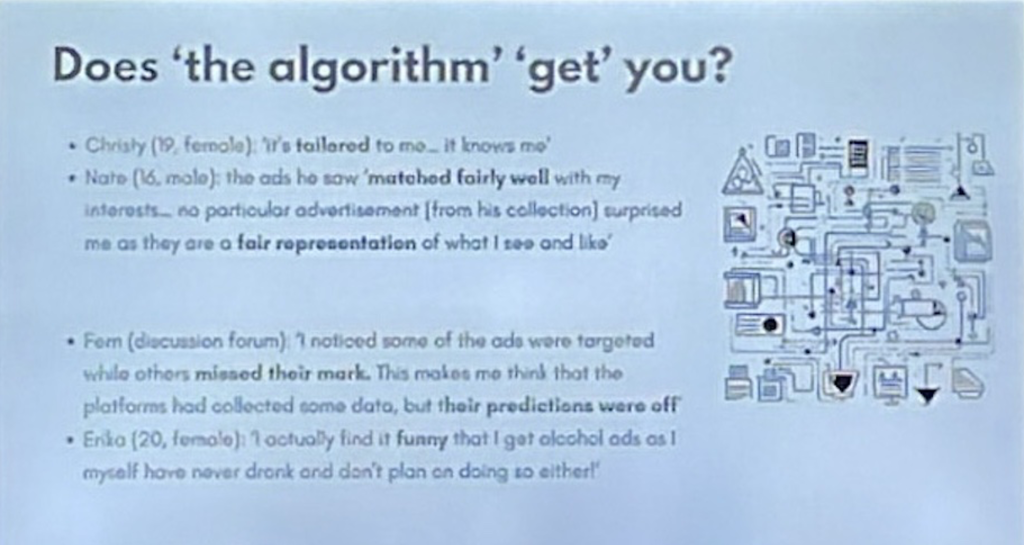
Slide from Brady Robards’ presentation of ‘Algorithmic gossip in young people’s accounts of ‘unhealthy’ advertising on social media’ @ AoIR 2024.
There was an abundance of presentations on research using digital methods, paramount for me to attend as I’m using this approach in my methdology. The work coming out of Monash University, Queensland University of Technology and University of Queensland inspired me a lot, in particular the research projects investigating algorithmic gossip in young people’s accounts of ‘unhealthy’ advertising on social media and analysing Facebook adverts using data donation techniques. For the former on AoIR day two, Brady Robards from Monash presented fascinating findings on young people’s engagement with alcohol adverts on Instagram and how they interpreted what they were served depending on their engagement with the algorithm (please see the full ‘Buy Now’ study here). Collecting data through screenshotting and interviews, the study measured algorithmic gossip and whether Instagram’s feed ‘got me’. The results ranged from acceptance of how the algorithm works in relation to searches and laughing at its inaccuracy; to paranoia about its accuracy as a form of surveillance, and even whether taking part in the research prompted more ads to be served. To refer to Shifman’s section of the Eras talk, this is the hypercommercialisation of social media in full effect, manifesting multifarious impacts on young users’ everyday lives and questioning the ethical considerations of advertising unhealthy products through algorithmic targeting.

AoIR 2024 Logo
On AoIR day 4, Daniel Angus from Queensland University of Technology presented interesting and methodologically-innovative research into Facebook advertising using data donation techniques based on the Journal of Advertising paper ‘Computational methods for improving the observability of platform-based advertising‘. The data donation collection process from participants is facilitated by a combination of a browser plug-in and a mobile screen recording app (details at Mobile Ad Observatory here). The latter uses machine vision to pull out advertising content and scrambles other personal content from users’ feeds – and so respecting participants privacy. It then uploads the screen recordings to the Automated Decision-Making and Society (ADMS) cloud and database folder. Using an opt out method of data donation, media go-alongs were conducted with participants to browse the ADMS data dashboard and decide what they wanted to delete from the screen recordings. This was incredibly interesting from a digital methods research design angle, as well as learning about how Meta’s advertising algorithm works to promote certain types of ads depending on subject matter and target market. Above all, it highlights how algorithms precisely curate and monetise users’ browsing experiences, and in doing so, fulfils Meta’s ultimate goal of maximising advertising revenue and maintaining their market dominance alongside Google.
This resonated strongly with the previous presentation in the Data and Tracking panel, where Jennifer Pybus and Mina Mir from York University Canada outlined their damning study into FemTech menopause apps, their datafication, extraction and value creation processes. The majority of which are owned by Meta and Google… Pybus and Mir used the Google Firebase SDK Discovery Tool to analyse 17 Google services including AdHub and AdManager, then repeated the study across Meta services. The most troubling finding is how Meta and Google menopause apps apparently circumnavigate GDPR to sell intimate biometric data to third party companies without users’ consent. If Big Tech self-tracking apps are extracting data from the most personal everyday female experiences and disregarding digital laws, how does this portend for future regulation in the era of commercial AI integration? With amazing research like this happening within the community, we can fight back to secure data rights rather than accept this heinous violation and exploitation of people’s data.
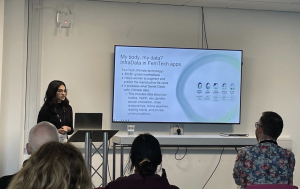
Mina Mir presenting Tracking Menopause, An SDK data audit for intimate infrastructures of datafication @ AoIR 2024
It’s an understatement to say that AoIR 2024 left me with lots of enlightening, inspiring and downright alarming things to think about. It was such a rewarding experience. To take the edge off, there were plenty of receptions, pub huddles and a joyful reunion with Digital Good Network colleagues to attend. The closing party at MAGMA exhibition centre was a lot of fun, where it turns out academics love nothing but a bumper car race after a few drinks..! Above all it was good to feel not just welcomed but warmly embraced by the digital media academic community. I look forward to getting further involved as I progress through my persuasive app culture doctoral research and AI, data and communication lecturing.
Learn more about AoIR2024 here.
DEBBIE BALL
Debbie Ball is a third year doctoral researcher in persuasive app culture and design features, and Data and Society lecturer at University of Westminster. D.Ball@Westminster.ac.uk


